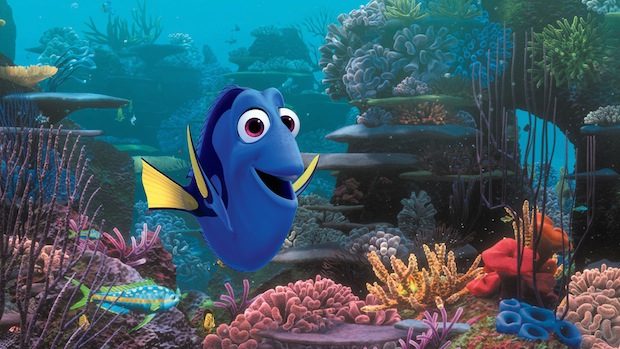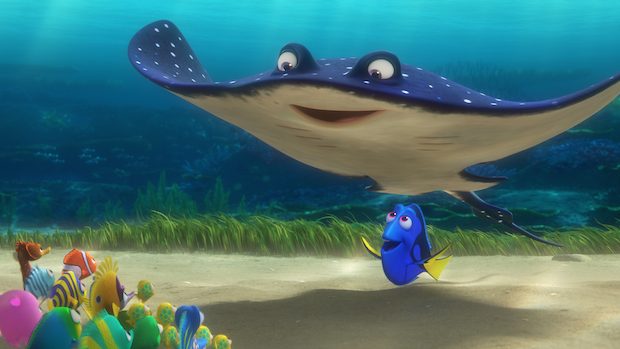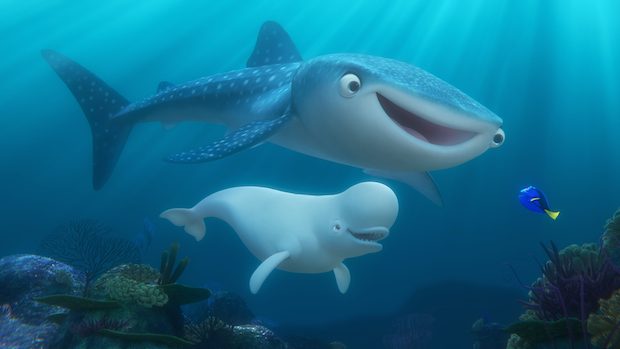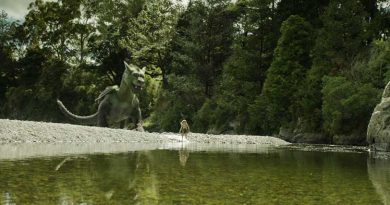Disney and Pixar’s Finding Dory – Maggie’s Review

More than a decade after “Finding Nemo”, Disney and Pixar revisit Marlin, Nemo and Dory in a beautiful, funny, touching film that mines new emotional and technical depths. After playing a supporting role in the 2003 film, Dory (voiced by Ellen DeGeneres) returns as the focus and namesake of “Finding Dory”. After receiving only small details in Finding Nemo, the audience is treated to a rich, clever origin story and fulfilling emotional arc in “Finding Dory”.
The first scenes of “Finding Dory” rehash some of the familiar beats of “Finding Nemo”: Nemo adventuring, Marlin fretting, Dory forgetting. However, where Dory’s short-term memory loss was once played for laughs, there is now a bitter aftertaste to repeated questions and absent mindedness. Early on, she experiences the revelation that, just like the other creatures around her, she must have a home and a family. From here, Dory, Marlin (Albert Brooks) and Nemo (Hayden Rolence) set off to find where she came from and what has become of her family, encountering a few familiar faces and many new ones along the way.

“Finding Dory” takes an innovative approach to exploring what was once a side character. Rather than simply going back to the beginning of her story, or relying heavily on flashbacks, the film’s creators take small moments from “Finding Nemo” and magnify them. Details like Dory’s ability to read English or “speak whale” act as threads that weave together her past, without feeling overwrought or referenced for Easter egg-sake. The flashbacks that are dispersed throughout the movie feel organic, and Dory’s short-term memory loss allows the audience to experience emotional moments along with her, seemingly for the first time.

Another triumph of the movie are the minor characters. From smallest cameo to major supporting role, each of the new creatures that Dory meets along her journey add something to the film. Though on its face Finding Dory’s premise of a memory-impaired girl’s search for her forgotten family and home seems pretty bleak, the movie’s second act is consistently laugh-out-loud funny, due in large part to its supporting characters. One such character is Hank (Ed O’Neil) a grumpy octopus who agrees to help Dory in order to achieve his own ends. Aside from visually being the most interesting element of the movie, Hank refreshes the main ensemble and keeps the movie from simply hitting the same beats as its predecessor.

Finding Dory’s final and most impressive triumph is its ability to bridge the 13 year gap since “Finding Nem”o. Separated by about half a generation from the audience of the first film, many children will likely see “Finding Dory” before seeing “Finding Nemo”. Though the movie keeps close ties with the first film, it doesn’t rely on extensive prior knowledge of “Finding Nemo” and acts as a seamless introduction to the established universe. While small children can take away Finding Dory’s themes of self-acceptance and perseverance (“Just keep swimming”), those who saw “Finding Nemo” in theaters as a child (myself included) and even older audiences will likely find Dory’s journey to be emotionally mature and relatable.

Though the first act of the film is a little slow and retreads the beginning of “Finding Nemo”, “Finding Dory” quickly picks up the pace. The tone is expertly balanced between humorous and introspective, and will provoke both laughter and tears. “Finding Dory” does a tremendous job of weaving a story in a rich environment that is simultaneously fresh and familiar. Definitely worth the wait.


